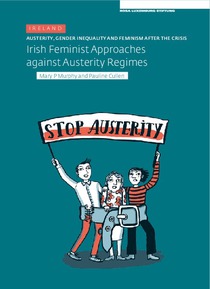Irish feminist approaches against austerity regime
"Legislative progress has been largely revenue neutral and consistent with the underlying logics of neoliberalism and the overall common sense of a crisis "within" rather than "of " capitalism. Key narratives of gender equality reinforce the business case and downplay more r...
| Main Authors: | , |
|---|---|
| Institution: | ETUI-European Trade Union Institute |
| Format: | TEXT |
| Language: | English |
| Published: |
Berlin
2018
Rosa-Luxemburg-Stiftung |
| Subjects: | |
| Online Access: | https://www.labourline.org/KENTIKA-19301294124911294769-irish-feminist-approaches-agai.htm |
| Summary: | "Legislative progress has been largely revenue neutral and consistent with the underlying logics of neoliberalism and the overall common sense of a crisis "within" rather than "of " capitalism. Key narratives of gender equality reinforce the business case and downplay more radical versions; demands which situate feminism within a class project are rarely visible. Irish feminist approaches against austerity illustrate a range of complex realities and responses. Political responses have to be understood in the context of processes of de-politicisation and de-democratisation. Processes at an EU level weakened the commitment to gender equality as a goal, with the case for gender equality increasingly understood through a business lens. This translates into the national level where we see a weakening of both state and civil society infrastructure and a narrower, instrumentalised state approach to gender equality. We note tensions within feminism as both liberal and radical versions respond in distinct ways to these trends creating different alliances with the state and forms of left politics.
These varying resistances and contradictions reflect the diverse realities experienced and strategies employed by different classes of women and varying levels of intersectionality, raising questions of "what and whose crisis"? While the two are interrelated, women appear to respond at two distinct levels, campaigning against austerity and specifically for sexual and reproductive freedoms, sometimes together but more often separately. Strategies that can find common ground between these forces of feminism are more likely to create critical mass and attract a wider range of left alliances and overcome the fragmentation so far evident in Irish feminist approaches to austerity." |
|---|---|
| Physical Description: | 62 p. Digital |

